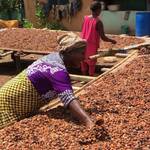Ivory Coast and Ghana’s cocoa regulators will boycott industry meetings in Brussels next week due to a dispute over pricing that they say has seen multinational chocolate companies resist measures to lift farmers’ incomes.
The two countries, which together produce more than 60% of the world’s cocoa, impose two premiums on their beans aimed at tackling farmer poverty.
One premium, known as the origin differential, has dropped below zero in recent years under pressure from traders, effectively cancelling out part of another premium, the $400 per tonne Living Income Differential (LID).
Both countries said in July that they would no longer sell cocoa with a negative origin differential, fixing it at zero for Ivory Coast and at +20 pounds sterling ($22) per tonne for Ghana.
But companies including some of the world’s major chocolate makers and cocoa traders, which account for around 90% of purchases, are pushing for origin differentials as low as -200 pounds per tonne, the regulators said.
“The chief executive is not attending the World Cocoa Foundation (WCF) meeting in Belgium and none of the executives at COCOBOD will be there,” said Fiifi Boafo, spokesman for COCOBOD, Ghana’s cocoa regulator.
Yves Brahima Kone, the director general of Ivory Coast’s Coffee and Cocoa Council (CCC), also said he would not attend the WCF meeting or any other industry meetings in protest.
Although Ivory Coast said last month it had sold some contracts with a non-negative premium, it is now having difficulty selling them.
“The major chocolate brands have resisted and tried to find means to circumvent payment of the LID,” said COCOBOD’s Boafo, accusing multinationals of waging a “silent war” against the farmers’ premium.
“A direct rejection of the LID would give brands bad publicity since the LID represents the economic pillar of sustainability, therefore erosion of the origin differential was the easier target,” he said.
The two regulators did not name any companies in their comments.
Major players Cargill, Olam and Barry Callebaut declined to comment when contacted by Reuters. Others including Nestle, Mondelez, Hershey and Mars Wrigley, and traders Touton, CEMOI and Ecom Trading, did not immediately respond to requests for comment.
Sustainability programmes launched since 2008 and aimed at tackling issues such as child labour have also benefited companies more than farmers, said the CCC’s Kone. Ivory Coast’s cocoa production has almost doubled in less than 15 years under the programmes, which has pushed down prices.
“We are considering new ways to address this issue with the industry, including banning access to our cocoa farms for their sustainability programs,” Kone said.
Reuters
- Mahama unveils Code of Ethics for appointees - 5 May 2025
- No system breach, MoMo is safe, secure- MTN - 5 May 2025
- Historic CJ Torkornoo’s reinstatement demo ends peacefully - 5 May 2025




